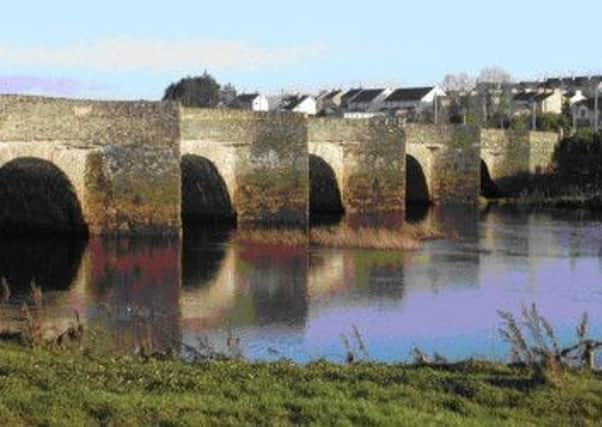Clady panady and ‘Boodley’s’ epic court


Poor Charlie had been walking the roads of Clady to see Maggy - literally for generations - when all of a sudden their romance ended.
At least that’s according to Katy McLoughlin and Frank McCorkell who tell the yarn.
Advertisement
Hide AdAdvertisement
Hide Ad“Charlie was renowned: he was going with his girlfriend for how many years? At least 45 years,” recalled Katy.


Frank McCorkell puts the longevity of ‘Boodley’ and Maggy’s relationship, which went on for nearly half a century, into some perspective.
“I actually walked the roads then, courting with ‘Boodley,’ still going to court Maggy, because he was courting Maggy when my Da was courting my Ma,” said Frank.
Katy added: “To make a long story short, Maggy Donaghy finished with Charlie.
Advertisement
Hide AdAdvertisement
Hide Ad“She was bored. Gone with him after 47 years. And she was finished with him and he was found dead in his bed a couple of days after. He was found dead in his bed when Eileen went to waken him.”


Katy and John were among nine participants from the Clady, Strabane and Castlederg areas, who recently talked to the Border Lives multi-media project for a film focusing on the villages and towns of the Derg, Finn and Mourne rivers.
The participants talked about times gone by as well as some of the challenges they still face today in building cross-community relations.
Katy and Frank were joined by several neighbours, including Cyril McGhee, who remembers hearing cattle rustlers in the dead of night when lying in bed as a boy.
Advertisement
Hide AdAdvertisement
Hide Ad“We lived in a dwelling. I wouldn’t call it a house as it was formerly a customs hut and we were frequently flooded.


“One of my earlier memories was lying in bed hearing the hooves of the cattle running, being smuggled across the border,” said Cyril.
Living on the border meant the area was a popular haunt with smugglers and it also did odd things to commodity prices, as Pat Kirk explains.
“The goats come to the back of the bridge and then the lorries come to the foot of the bridge and you put the goats on then. There was a whole scatterment of goats,” said Pat.
Advertisement
Hide AdAdvertisement
Hide Ad“The tea would have been cheaper here. It would have been very dear in the Free State. You used to get a pound of tea for a pound.”


Sam and Joe Bogle remember a happy childhood that wasn’t without hardship.
“There were two houses and underneath them the Kirks kept pigs and cows,” said Sam. “They were underneath this, the wooden floor, and we lived there.”
“As Sam says, where we lived was above a byre just,” agreed Joe.
Advertisement
Hide AdAdvertisement
Hide AdFrank accepted that there was poverty in the village but it was normal at the time.
“We were all poor. Of course we where. We weren’t aware we were poor because we had nobody to compare it to. Occasionally we did. It was a wee bit intimidatory even going to Strabane to a brightly lit tea shop,” he said.
Harvesting the potato fields and the blackberry bushes was one way of raising a few bob and an extra bit of income.
Pat recalled: “The schoolchildren used to get so many holidays during the black berry picking time and the potato gathering.”
Advertisement
Hide AdAdvertisement
Hide AdSam added: “Your parents would have got you to gather praties and blackberries and the money you would have got off that you would have bought yourself a pair of boots for the winter.”
Katy says her own family sold turkeys and on one occasion used the money for a musical treat.
“You kept dogs and we kept pigs and the first gramophone we got we got with the turkey money,” she said.
A great comfort food of the time that has now largely fallen out of fashion was the traditional ‘panady’ bread pudding.
Pat gives his recipe.
Advertisement
Hide AdAdvertisement
Hide Ad“You got yourself a slice of bread, you put it on the plate and you put some sugar in it and then you put hot water in it and then a drop of ‘mil-lik in it - as Eddie Forest would say - and then that was your panady and that was it.”
Up the road in Castlederg the current Ulster Unionist Party Councillor (UUP) for the Derg Electoral Area, Derek Hussey, was amongst those who also took part in the film.
“This area was often referred to as the ‘Castlederg salient.’ There is a section of Northern Ireland that goes out into Donegal, surrounded on three sides by the Republic.
“I grew up in Omagh, in John Street, which is a fairly strong nationalist part of Omagh Town but my friends about the area where both Catholic and Protestant.
Advertisement
Hide AdAdvertisement
Hide Ad“Through school, obviously my Protestant friends, but my Catholic friends would have been neighbours in the area and people who I’m still friendly with and I meet folk when I’m up in Omagh and I meet folks. ‘How you doing Derek? Long time, no see.’ You know. ‘You’re getting no younger.’
“And these are folk I would have known in the area of Omagh, known as The Hill.”